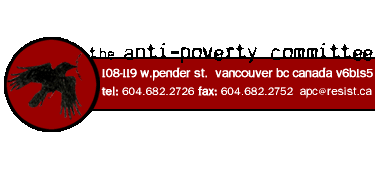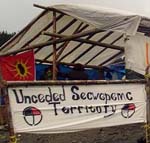 |
|
Home > Campaigns > Indigenous Solidarity > skwelkwek'welt > media reports > Cloud over Sun Peaks
|
Cloud over Sun Peaks
A planned $285M B.C. ski resort expansion has divided the native community and sparked a bitter land claim battle
John Greenwood
Financial Post
Monday, September 20, 2004
SUN PEAKS, B.C. - From the road, all you can see is the protestors' shelter -- tree trunks covered with blue plastic at the edge of the yet-to-be-completed 15th fairway. It's raining today and the group has retreated inside. But the workers building a string of nearby condominiums are careful to give the camp a wide berth -- a deer carcass was recently spotted hanging by the shelter and they worry about stray bullets from the group's hunting activities.
"We've just got a chunk of the meat left," said Janice Billy, a member of the Shuswap First Nation and one of the protest leaders. "The rest is in someone's freezer."
For the past four weeks, the protestors -- there are nine on this day, native and non-native -- have been camped out at Sun Peaks, a popular ski resort about five hours northeast of Vancouver.
They are protesting a planned $285-million expansion that will include several new ski runs, hotels and condominiums with space for more than 10,000 beds.
In the 12 years since Nippon Cable Co. of Japan bought Sun Peaks, it has become one of the most successful ski resorts in Western Canada. Today it employs 1,100 people and is home to 400 permanent residents.
But with that growth has come controversy. And the battle has divided the local native community.
What the protesters are trying to accomplish depends on who is talking. According to Ms. Billy, it is to force the government to recognize the right of the Shuswap to their ancestral territory, including the land on which Sun Peaks sits. But if you talk to the Council of Canadians, one of several non-native groups that has waded into the dispute, the issue has to do with the environment, or more precisely the effect of resort development on aquifers.
One thing that is not disputed is the protest has placed Sun Peaks at the centre of a bitter land claim battle over which it has no control and indeed isn't even a participant.
Since Ms. Billy and her associates first began targeting the resort about four years ago, company officials have been forced to make regular appearances in the media to fend off charges that they have somehow taken the land illegally.
The truth is virtually all of British Columbia is subject to native land claims and Sun Peaks is no different from nearly every other business operating in the province.
Officially, Sun Peaks denies the protest has had an effect on its bottom line. But in an industry as cutthroat as this, all that negative attention can hardly be helpful.
Despite the controversy, Sun Peaks is a rare success story in British Columbia. While other businesses, including some resorts, have been forced to make cut backs, Sun Peaks has been quietly flourishing. Since being bought by a private Japanese company in 1992 it has grown to become one of the biggest ski resorts in the province.
Most Shuswap elected leaders want nothing to do with the protesters. Nathan Matthew, chairman of the Shuswap Nation Tribal Council, said the protesters don't represent the views of the majority of the people.
The council, which represents all 17 bands, issued a statement sharply criticizing the group.
"Protests such as these continue to have a detrimental effect on our economic and tourism developments that will be long lasting," said Richard Lebourdais, chief of the Whispering Pines Indian Band.
"It is insulting when outside groups attempt to compromise our efforts in dealing with issues that affect our people in our territory," said Felix Arnouse, chief of the Little Shuswap Band, referring to groups such as the Council of Canadians and the Anti-Poverty Committee that have taken up the cause.
The chiefs make no bones about the fact they have an outstanding land claim against the government.
The Shuswap have laid claim to a vast slice of the south central part of British Columbia, running from the Alberta border in the east to the town of Williams Lake in the north Okanagan.
Like many B.C. first nations, they never signed any treaties giving up title to their ancestral lands. But after years of protest that brought only economic stagnation, Shuswap leaders decided their battle is best fought in court. In the short term, they have decided the best way to serve their people is to become players in the local economy.
The last thing they want is a gaggle of fringe groups getting involved and muddying the waters even further than they are already, which is why members of the tribal council have responded so harshly.
Back at Sun Peaks, Chris Nicolson, president of Sun Peaks Tourism, shakes his head in dismay. The British Columbia Supreme Court on Sept. 3 issued an injunction ordering the protesters to leave. The police have said they arrest the protesters unless they obey the order.
But there have been arrests before and the protesters have always returned.
"It makes us feel powerless," Mr. Nicholson said.
While Nippon Cable is the main investor, it isn't the only one.
Other investors include some of local first nations communities. The Little Shuswap Band has several joint ventures with the resort, including a housing development. The band recently built a 72-room hotel on their reserve, not far from the resort. And they're in talks to start a joint venture around a back-country skiing company, according to Mr. Arnouse, the chief.
He said the idea was to create jobs for band members, but it's not turning out that way. "The businesses have been negatively impacted by the protests," Mr. Arnouse said.
|
|
|

|

|
 Skwelkwek'welt Solidarity 
Home
Updates
Media Reports
Press Releases
Articles
Documents
Campaign
Photos
Posters
Audio & Video
Convergence Info
Upcoming Events

Sun Peaks is built on Secwepemc land, which the Secwepemc refer to as Skwelkwek’welt, located in BC’s interior, 30 km NE of Kamloops. Secwepemc have never ceded, surrendered or released their land in any way. In 1997, the BC government approved a $70 million development plan, allowing Sun Peaks to continue to expand their resort to 20,000 beds and put ski runs on the previously undisturbed Mt. Morrisey. The Secwepemc attended stakeholder meetings and clearly said no to the development. Land and Water BC however, clearly disregarded their voices and granted new leases to Sun Peaks to facilitate their expansion, and in June 2001, Land and Water BC obtained a court injunction to forcibly remove Secwepemc from their lands. To date, 54 arrests with charges from criminal contempt and intimidation by blocking a road to resisting arrest have been made.
FOR MORE INFO ON SECWEPEMC RESISTANCE:
Turtle Island Native Network News - Secwepemc
Union of BC Indian Chiefs - Sun Peaks
Skwelkwekwelt Protection Centre
Recent Article:
ZMag
Land, Freedom and Decolonization Coalition
Land, Freedom, Decolonization Coalition is a network of groups and individuals in Vancouver from Native Youth Movement, Native Solidarity Network, No One is Illegal, Refugees Against Racial Profiling, South Asian Network for Secularism and Democracy, Palestine Community Center, Anti-Poverty Committee, International Solidarity Movement, Bus Riders Union, South Asian Youth Alliance, Friends and Families of Mexican Political Prisoners, Committee for Solidarity with Columbia, and others.
|
|